★★★
“How do you solve a problem like Maria-n…?”
 The above rating reflects my deep-held tolerance for low budget cinema. If a film is made with heart, I’m generally prepared to overlook, to some degree, technical shortcomings. Both sides of that equation are present here, in a somewhat revisionist take on the Robin Hood mythos. This takes place after Hood’s original victory over the Sheriff of Nottingham, and he has now gone on crusade to the Holy Lands with King Richard. In their absence, however, the country has not fared well. Marian (Craig) has adopted another identity, and is hiding out as novice nun Matilda, though occasionally sneaks out to help poach from the rich, and give to the poor.
The above rating reflects my deep-held tolerance for low budget cinema. If a film is made with heart, I’m generally prepared to overlook, to some degree, technical shortcomings. Both sides of that equation are present here, in a somewhat revisionist take on the Robin Hood mythos. This takes place after Hood’s original victory over the Sheriff of Nottingham, and he has now gone on crusade to the Holy Lands with King Richard. In their absence, however, the country has not fared well. Marian (Craig) has adopted another identity, and is hiding out as novice nun Matilda, though occasionally sneaks out to help poach from the rich, and give to the poor.
Richard dies abroad, and Robin (Andersen) returns, to find himself greeted warmly by Marian, who has been booted out of her religious order, and not-so warmly by the former Sheriff, William De Wendenal (Cryer), who still bears a grudge against the pair for their role in the loss of his title. Robin is captured and injured, leaving Marian as the only hope of rescue before he’s executed along with his long-time sidekick, Little John (Pellet). Naturally, she is more than up to the task, having both run with the outlaws of Sherwood Forest, and then had to fend for herself, during the three-year span when Robin was overseas. While Marian may be a damsel, she’s more likely to be causing distress, rather than being in it.
She’s certainly more convincing a hero of folklore than Robin, who looks barely old enough to shave, never mind lead a popular rebellion against authority. As a contrast, the last film I saw about the character returning from the Crusades was Robin and Marian, starring a very world weary and middle-aged Sean Connery. Andersen has none of that gravitas, perhaps deliberately to avoid taking the focus away from the heroine. Craig is fine, holding her own dramatically and in action, and occasionally better than fine, even if the ease with which she dispatches enemies close to twice her weight in sword-fights, is painful. In particular, their “armour” doesn’t seem to give them any protection at all: the slightest tap from Marian and they fold like cheap sheets.
As noted, you very much need to be able to look past what is, by and large, an exercise in running around in the forest. There are no bustling towns to be found here: I’m not sure there was ever a scene where the count of participants reached double figures. The buildings are unconvincing. and you never get any sense of this genuinely being the 13th century. However, it is played gratifyingly straight, since otherwise it’d have to compete with fondly-remembered nineties TV series, Maid Marian and her Merry Men (created by Baldrick from Blackadder). Yet it’s also so fast and loose in its cheerful disregard of historical accuracy, it almost plays as a dead-pan spoof. The ending is left wide-open for a sequel, and despite (because of?) all its flaws, I have a sneaking hope that comes to pass.
Dir: Bill Thomas
Star: Sophie Craig, Dominic Andersen, Bob Cryer, Jon Lee Pellet





 The main theme of this book appears to be, “How far will a mother go, to protect her daughter?” Based on what we read here, the answer to that question appears to be, “Very, very far.” The heroine is Sherica Daniels, who initially appears to have somewhat lucked out and escaped a nasty and abusive relationship. Her husband, drug addict Roy, has just died following a pair of botched armed robberies. That should leave her and teenage daughter Ashlynn to get on with their lives. Not so fast. For it’s only a short while before Roy’s drug dealer, Tokie, shows up. He’s demanding Sherica pays her husband’s debt – and more, because he believes she knows where the unrecovered loot from Roy’s robberies was hidden. When she fails to convince Tokie otherwise, he abducts Ashlynn.
The main theme of this book appears to be, “How far will a mother go, to protect her daughter?” Based on what we read here, the answer to that question appears to be, “Very, very far.” The heroine is Sherica Daniels, who initially appears to have somewhat lucked out and escaped a nasty and abusive relationship. Her husband, drug addict Roy, has just died following a pair of botched armed robberies. That should leave her and teenage daughter Ashlynn to get on with their lives. Not so fast. For it’s only a short while before Roy’s drug dealer, Tokie, shows up. He’s demanding Sherica pays her husband’s debt – and more, because he believes she knows where the unrecovered loot from Roy’s robberies was hidden. When she fails to convince Tokie otherwise, he abducts Ashlynn.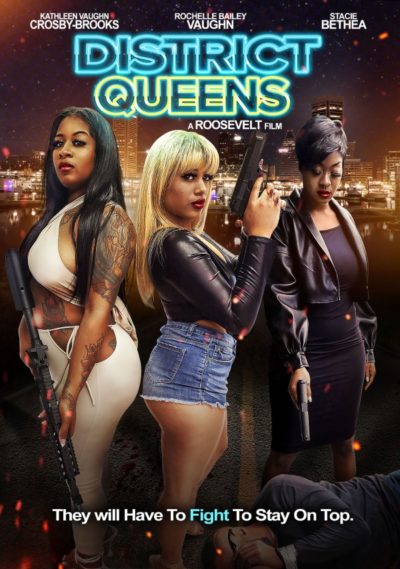 The latest stop in our ongoing tour of female-driven urban crime movies brings us to the nation’s capital in Washington, where the police are celebrating just having taken down a leading light in the city’s organized crime industry. Now, they set their sights on a new target: the gang led by Racine Robinson (Vaughan) and her two daughters, Kat (Crosby) and Candy (Bethea). These might prove a tougher nut to crack, since the Robinson crew have a harsh, zero tolerance policy to anyone who messes with them in the slightest, yet also gathered local support during the coronavirus pandemic. Indeed, Racine is so popular in the neighbourhood, a run for political office is not out of the question. However, she has rivals, who have more than a passing interest in seeing her taken out of the picture – albeit for very different reasons, in order to make room for them to rise up.
The latest stop in our ongoing tour of female-driven urban crime movies brings us to the nation’s capital in Washington, where the police are celebrating just having taken down a leading light in the city’s organized crime industry. Now, they set their sights on a new target: the gang led by Racine Robinson (Vaughan) and her two daughters, Kat (Crosby) and Candy (Bethea). These might prove a tougher nut to crack, since the Robinson crew have a harsh, zero tolerance policy to anyone who messes with them in the slightest, yet also gathered local support during the coronavirus pandemic. Indeed, Racine is so popular in the neighbourhood, a run for political office is not out of the question. However, she has rivals, who have more than a passing interest in seeing her taken out of the picture – albeit for very different reasons, in order to make room for them to rise up. This is part of the Blood universe, which previously gave us anime series
This is part of the Blood universe, which previously gave us anime series 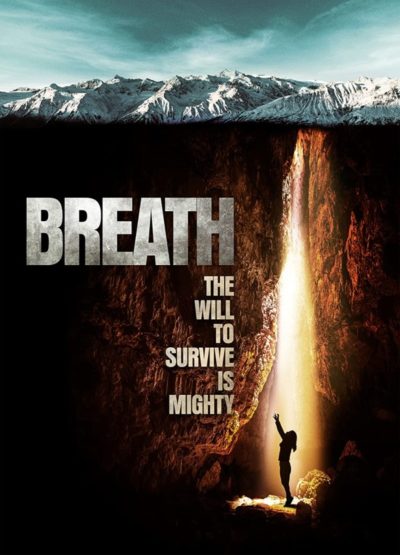 Lara Winslet (Daigh) is a vulcanologist, who is on the side of a mountain in Italy, taking samples, when the ground gives way beneath her, and she falls into an underground pit, damaging her leg in the process. Help isn’t going to come, so with limited resources (not to mention a count of functioning limbs that stops at three), she is going to need to cope with the situation on its own, and figure a way out of what could easily become a fatal scenario. Meanwhile, on the outside, her father (Cosmo) is becoming increasingly frantic. This is erhaps because if Lara doesn’t come back, he’s going to be stuck permanently with her kid (Di Mauro). That would be my reaction, anyway…
Lara Winslet (Daigh) is a vulcanologist, who is on the side of a mountain in Italy, taking samples, when the ground gives way beneath her, and she falls into an underground pit, damaging her leg in the process. Help isn’t going to come, so with limited resources (not to mention a count of functioning limbs that stops at three), she is going to need to cope with the situation on its own, and figure a way out of what could easily become a fatal scenario. Meanwhile, on the outside, her father (Cosmo) is becoming increasingly frantic. This is erhaps because if Lara doesn’t come back, he’s going to be stuck permanently with her kid (Di Mauro). That would be my reaction, anyway… Margo Crane (DelaCerna) has been brought up by her native American father, since her mother walked out on them several years ago. Under his guidance, they have become self-sufficient, and Margo has become a crack shot. However, her creepy uncle ends up having sex with the teenager, an incident for which she gets blamed, ruining her life. She resolves to apply her shooting skills on him, only for the resulting incident to become a tragedy. Margo strikes out on her own up the Stark river, in search of her absent mother. Doing so, she meets a variety of people, then has to try and reconnect with a woman who now has her own life, one not necessarily helped by the unexpected arrival of a teenager.
Margo Crane (DelaCerna) has been brought up by her native American father, since her mother walked out on them several years ago. Under his guidance, they have become self-sufficient, and Margo has become a crack shot. However, her creepy uncle ends up having sex with the teenager, an incident for which she gets blamed, ruining her life. She resolves to apply her shooting skills on him, only for the resulting incident to become a tragedy. Margo strikes out on her own up the Stark river, in search of her absent mother. Doing so, she meets a variety of people, then has to try and reconnect with a woman who now has her own life, one not necessarily helped by the unexpected arrival of a teenager.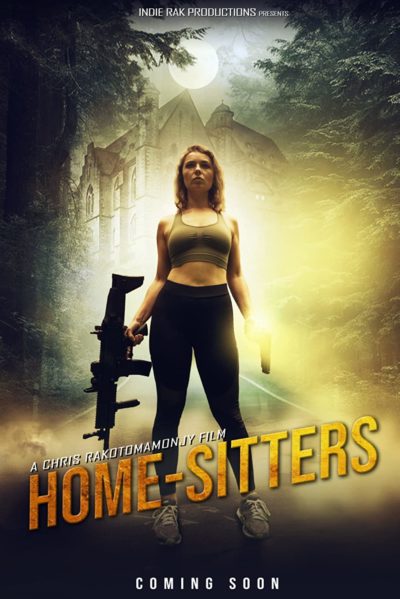 June Williamson (Guillot) is an out-of-work actress, who just broke up with her boyfriend, Oliver (Vernet), and is behind on the rent to her creepy landlord. An unexpected lifeline arrives in the shape of a very well paid gig, house-sitting a large house, deep in the countryside. Things get annoying when Oliver and his asshole pal Marcel (Thevenoud) show up. They get worse when Oliver admits they had an accident on the way, and there’s a body in the car boot. A stare of “terrible” is reached when the body vanishes. And we reach peak awful, when the house comes under siege from Wolfströeme (Bary) and his heavily-armed gang of mercy, who are looking for…
June Williamson (Guillot) is an out-of-work actress, who just broke up with her boyfriend, Oliver (Vernet), and is behind on the rent to her creepy landlord. An unexpected lifeline arrives in the shape of a very well paid gig, house-sitting a large house, deep in the countryside. Things get annoying when Oliver and his asshole pal Marcel (Thevenoud) show up. They get worse when Oliver admits they had an accident on the way, and there’s a body in the car boot. A stare of “terrible” is reached when the body vanishes. And we reach peak awful, when the house comes under siege from Wolfströeme (Bary) and his heavily-armed gang of mercy, who are looking for…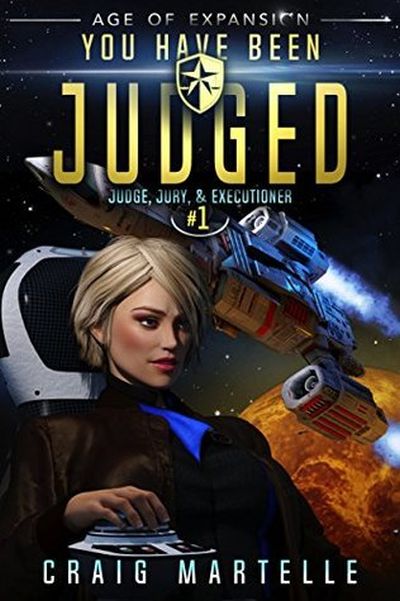 This is another entry in the sprawling Kurtherian Gambit universe, which must have well over a hundred books in it, by a slew of different authors. I’m gradually coming to a couple of conclusions: a) it’s a very loosely-tied series, and b) the quality varies. When you give your book a title like this, evoking the spirit of Judge Dredd, you are setting certain expectations. Unfortunately, this is a book which fails to meet them, with a heroine who never achieves the level of intensity necessary to live up to the series title: Judge, Jury, Executioner. It has reached 16 volumes, which suggests either there’s a market for it, or the author has too much time on their hands. No prizes for guessing my opinion.
This is another entry in the sprawling Kurtherian Gambit universe, which must have well over a hundred books in it, by a slew of different authors. I’m gradually coming to a couple of conclusions: a) it’s a very loosely-tied series, and b) the quality varies. When you give your book a title like this, evoking the spirit of Judge Dredd, you are setting certain expectations. Unfortunately, this is a book which fails to meet them, with a heroine who never achieves the level of intensity necessary to live up to the series title: Judge, Jury, Executioner. It has reached 16 volumes, which suggests either there’s a market for it, or the author has too much time on their hands. No prizes for guessing my opinion.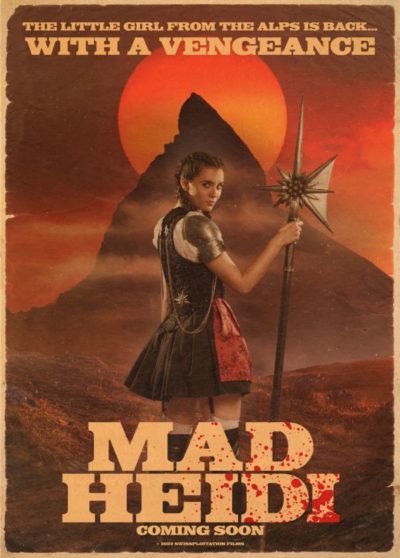 I’d been aware of this movie for some time, through its innovative crowd-funding approach, which raised $3 million to cover the cost of production. After COVID hit, there were doubts it’d ever see the light of day, but here it is: the first “Swissploitation” film [If not quite the case, it’s certainly the first one with a seven-figure budget, as well as the first Swiss movie covered on this site] And it’s not bad: if you’re familiar with similarly crowd-funded spoof, Iron Sky, this is along similar lines of broad parody. It covers almost every genre of cult from kung-fu films through Starship Troopers to women-in-prison films, e.g. there’s an Asian prisoner
I’d been aware of this movie for some time, through its innovative crowd-funding approach, which raised $3 million to cover the cost of production. After COVID hit, there were doubts it’d ever see the light of day, but here it is: the first “Swissploitation” film [If not quite the case, it’s certainly the first one with a seven-figure budget, as well as the first Swiss movie covered on this site] And it’s not bad: if you’re familiar with similarly crowd-funded spoof, Iron Sky, this is along similar lines of broad parody. It covers almost every genre of cult from kung-fu films through Starship Troopers to women-in-prison films, e.g. there’s an Asian prisoner  I was going to start this with a warning to try and avoid reading other reviews of this before watching it, because it felt as if, without exception, they all included spoilers for a significant plot-point, that wasn’t actually revealed until deep into the movie. Heck, the IMDb synopsis does it too. However, having sat through the entirety of this bland piece of indigenous folk pseudo-horror, all I can say is “Meh.” You do you: it’s probably not as if it’s going to have much impact, because it’s hard to spoil something which already smells past its best before date.
I was going to start this with a warning to try and avoid reading other reviews of this before watching it, because it felt as if, without exception, they all included spoilers for a significant plot-point, that wasn’t actually revealed until deep into the movie. Heck, the IMDb synopsis does it too. However, having sat through the entirety of this bland piece of indigenous folk pseudo-horror, all I can say is “Meh.” You do you: it’s probably not as if it’s going to have much impact, because it’s hard to spoil something which already smells past its best before date.